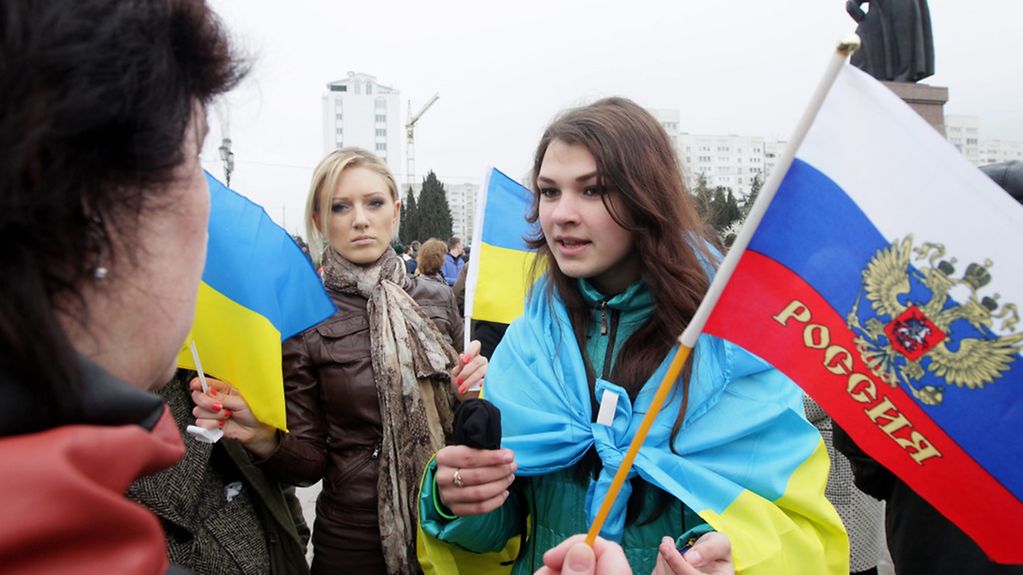Ukraine
The German government is concerned about reports of violent actions by pro-Russian forces in eastern Ukraine. This could result in economic sanctions being imposed on Russia, said government spokesperson Steffen Seibert in Berlin. At the same time Germany is working to de-escalate the situation.
3 min reading time

The German government is endeavouring to de-escalate the situation through diplomacy
Photo: picture alliance / dpa
Recent events in Donetsk and Kharkiv at the weekend are something, "that the entire government sees with great concern," said the government spokesperson. "All those responsible are still called on to do their bit to stabilise the situation and foster de-escalation."
Russia, said Steffen Seibert on Tuesday, is called on, "to do its bit to stabilise the situation, perhaps by exerting an influence on pro-Russian forces, in eastern Ukraine. These pro-Russian forces should be encouraged to respect the constitution of Ukraine and renounce the use of violence of any sort." Ukraine, for its part, must "make the forthcoming constitutional reform transparent," said the government spokesperson.
Further sanctions possible
At the CDU’s European party congress in Berlin, the Chancellor pointed out that Germany and its partners are in a position to move to the third stage of sanctions including economic sanctions - "should there be a political reason for doing so," said Steffen Seibert. "None of us want to see this, but let there be no mistake, we are ready and willing."
The last European Council meeting in Brussels asked the European Commission to initiate the preparatory work for sanctions of this sort against Russia. Should the day come - "although we hope it will not come to this, and would prefer to avoid it" – Europe and its transatlantic partners could act accordingly, said the government spokesperson. There is every reason to stress this, because "at several points we unfortunately cannot see the progress, and the stabilisation" that we would hope and wish to see.
No evidence that troops have been withdrawn
In their most recent telephone conversation, Russian President Vladimir Putin informed the Chancellor that Russian troops were to be withdrawn from the Ukrainian border. Russian Foreign Minister Sergei Lavrov confirmed this and spoke of the withdrawal of one battalion and further steps.
"Today it must be noted that we are still waiting for evidence that this withdrawal has really taken place, and that the tension at the border has been reduced tangibly as a result," said the government spokesperson. The must come as a disappointment, because Europe is waiting for "this urgently needed confidence-building measure" to become visible.
Germany still willing to talk
The current unsatisfactory situation will not make any difference to the willingness of the Federal Republic of Germany to talk. Germany is still endeavouring "to achieve de-escalation through discussion and diplomacy," explained Steffen Seibert. "The fact that things are not progressing very swiftly, and not on all points, does not affect our determination," he said.
OSCE observers in Ukraine
The fact that the OSCE observers have now begun work in Ukraine is a step in the right direction, said Steffen Seibert. This does not change the fact, however "that the reports this weekend from the two eastern Ukrainian cities are deeply troubling".
The mandate of the OSCE observer mission includes gathering information and reporting on the security situation. The mission will also be monitoring compliance with human rights, fundamental liberties and minority rights. Contact to local, regional and national agencies is important, as well as to civil society, ethnic and religious groups, and the local population.
The observer mission will aim to foster dialogue in Ukraine, defuse tensions, and normalise the situation. Germany will support the mission, and has contributed about one billion euros; one half of the sum is earmarked for projects and the other half for the seconded observers.